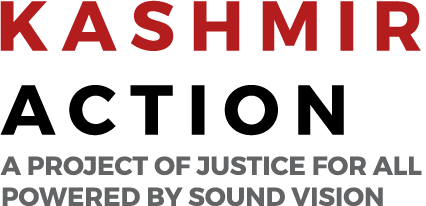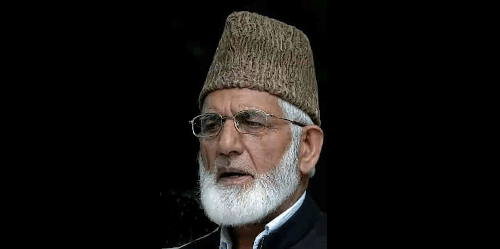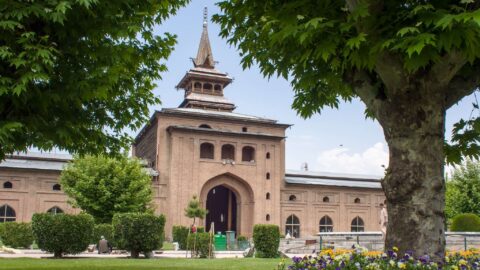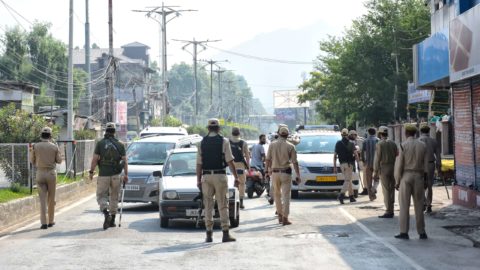The passage of India’s new Waqf Act has spotlighted the growing vulnerability of Muslim religious…
Tribute to Syed Ali Geelani, Kashmiri Freedom Fighter & Resistance Leader
On September 1st, 2024, Kashmiris and justice-lovers across the globe remembered Kashmiri freedom fighter, Syed Ali Geelani, on his death anniversary.
Written by Ather Zia
Syed Ali Geelani is unparalleled, and a beloved icon of Kashmiri resistance. He was a teacher, journalist, prolific writer, chairman of the All Parties Hurriyat Conference (APHC); former head of Jamaat-e-Islami and Tehreek-e-Hurriyat (a breakaway from Hurriyet Conference).
He is heralded by many Kashmiris, as their own Omar Mukhtar, the revolutionary Libyan leader who fought the Italian occupation. Geelani sab was lovingly called Bab, meaning “father” and referred to as “Quaid” which means a leader. These epithets should give us an idea of the deep connection and intimacy he shared with the Kashmiri people. This is especially true of the younger generation of Kashmiris who grew up in the last thirty years and saw him take the centerstage in resistance politics. Geelani sab enjoyed a massive following amongst young men, who not only looked up to him for political inspiration but religious and spiritual guidance as well. In any case, for Geelani sab political ethics were an extension of the religious and spiritual discipline.
The Indian government kept Geelani sab under house arrest for the last 11 years. True to his cause till the end, he passed on while imprisoned. Many times, he tried to with as much grace as he could only muster and confront the soldiers at his gate, but he was never allowed out. On and off he roughly spent 20 years of his life imprisoned and survived close to 12 assassination attempts on his life, while also battling serious bodily ailments.
Pro- Pakistan Stance
Geelani sab had a staunch pro-Pakistan stance. He did not believe in the idea of an independent Kashmir. In that, his political goal differed from many Kashmiris who believe Kashmir should be an independent nation. But in this context, one of the most remarkable things is and which speaks volumes about him as a person and his ethics of leadership that people inhabiting all parts of the political spectrum regarded him with deep respect and are mourning his passing equally. The grace of Geelani sab’s leadership was to respect all views. For him, the immediate cause of all Kashmiris was what bound us together which is to ensure the end of the Indian occupation – first and foremost. Once that happened, he believed that it is up to the people to choose their course. Even though he dreamed of joining Pakistan and having greater autonomy within the boundaries of an Islamic nation but if that did not happen, independence to him always stayed preferable to “Indian imperialism.”
I must mention before all the corrective analysis of Kashmir’s history vis a vis India that is present before the world today, it is in Geelani sab’s writing that we find the earliest and most forceful arguments against what he before anyone else termed as “Bharti Istimariyat” – Indian imperialism. He has a clear-eyed analysis of India’s ambition (not just as a postcolonial state but a neocolonial power) in the subcontinent and in Kashmir. At the same time, he clearly makes distinctions between the Indian nation-state and the Indian people. He minces no words in exposing the aspects of history, not only making arguments in favor of joining Pakistan but also exposing India as an aggressor and occupier. A prolific reader and a writer, Geelani sab leaves behind a legacy of more than 45 books also including memoirs, essays, and pamphlets. His mastery of Islamic theology, Iqbaliyat, and most Urdu literature will continue to be legendary. In that, he is more than a man of politics, and his writing now becomes key for us to keep his legacy of resistance alive. From as much as I have gleaned over the years in meetings and interviews with Geelani sab he was more a prolific reader than just a committed writer.
Being called a “Kashmiri Hawk”
The Indian government and media often referred to him as a hawk amongst the resistance leaders. In politics, a hawk, as we know is used most often negatively, for someone who favors war or continuing to escalate an existing conflict as opposed to other solutions. In that, it is true that Geelani sab never agreed to compromise on his ideals. He was against unconditional negotiations with the Indian government. He set conditions as all self-respecting leaders do. Knowing how much obfuscation and dilution India has created in and around Kashmir in the last 74 years, he was firm in not talking to India without full historical recognition of the Kashmiri stand. His conditions which he repeated in an open letter in 2016, included that India accepts Pakistan as a party to the dispute, considers Kashmir a disputed territory, and considers the Kashmiri right to self-determination under the UN resolutions. This was also the stance that led to the formation of a separate Tehreek-e Hurriyat headed by him.
True to his essence of ethical dissent, when the need arose, he reserved his critique for Pakistan as well. From time to time he was critical of Pakistan’s policies while remaining committed to their support for the resistance in Kashmir. His critique was heard loudest during the Kargil war when he reiterated Pakistan’s support for “the indigenous struggle of the people of Jammu and Kashmir, morally, diplomatically and politically” but at the same time said: “this does not mean Pakistan can take a decision on our behalf”. He also admonished Parvez Musharraf for his 4-pint formula – saying that “he gave in” and that Musharraf had “lost self-confidence.”
Geelani sab was never blindly beholden to any form of power. He was uniquely identarian as a Kashmiri Muslim and held close to his Islamic ideals and values.
Click here to watch Syed Ali Geelani’s Speech at the Azadi conference (New Delhi)
Early Political career
Geelani sab’s earlier political career has been a matter of great contestation, especially in the Indian quarters. They often deploy this narrative to undermine his firm resistance. His contesting five Assembly and three parliamentary elections and getting elected to the state legislature in 1972, 1977, and 1987 have been often portrayed as him endorsing Indian politics in his early career. This needs to be put into context. We must understand that India began weaponizing “democracy” as “politics” as a tool in Kashmir. It especially used “electoral” politics right from the beginning in 1947 to get away with “governing” Kashmir. Thus, from the very start resistance, politics and dissent were steadily criminalized. Kashmiris were left with no choice but to seek redress for the dispute through political mechanisms that were created around them. Even in those years Geelani sab was known to maintain his support for the right to self-determination. It cost Kashmiris half a century of Machiavellian policies, coups, imprisonment, and upheavals – direct and indirect violence to fully realize that India did not want to resolve the dispute in favor of Kashmiri and not ever peacefully. By 1989 it was clear that the entire spectrum, of all types of political action, had been exhausted, which is when we see leaders like Geelani sab emerge opening yet another chapter in Kashmiri resistance.
And that resistance is well and alive.
Geelani sab is not physically amongst us, but his spirit, example, and his body of work will continue to lead.
We are all aware of the rank depravity of Indian occupation as it desecrated the body of a man Kashmiris love and revere. His grave continues to be imprisoned. Even in death, the exemplar that Geelani sab was and is continued to expose the tyranny of Indian occupation.
We pray that he rests in eternal peace and power and may his people follow his example of principled dissent and see the dawn of freedom soon.
Ather Zia founder-editor at large of Kashmir Lit, is a poet, short fiction writer, and political anthropologist.





